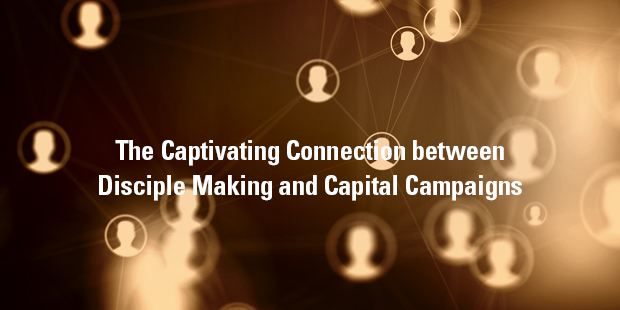
The Captivating Connection Between Disciple Making and Capital Campaigns
Among the reasons I am still committed to the “dust up” that campaigns create is that they raise way more than financial support. A discipleship-based campaign raises the faith temperature in the hearts of people in a way that is life-changing.
I have had the honor of collecting a traveler’s suitcase full of experiences from being involved in over 100 capital campaigns. So I have a perspective on the ones that do it with an eye toward life-change and the ones that are gunning primarily for the bucks. In a how-to manual I recently wrote for church leaders called Capital Campaign Playbook, I outline the ways churches can utilize best practices for campaigns with the dual goal of spiritual growth and financial success.
Of course campaigns can be run without the spiritual impact as a co-equal goal with the need for money. But I have met so many people who mark it as an inflection point in their spiritual life. They say things like: “Before the campaign, I didn’t understand how important money was to my relationship with God.”
The time for introspection and heart “check up” often leads to a heart change. Here are a few signs I’ve seen that this is true:
1) People Experience Joy
Even though most of us know that it is better to give than receive, we strangely spend a lot of our energy trying to be on the receiving end of things. When a heartfelt gift is given toward the work of God through my church, an incredible joy can be experienced. To know that we are participating with God and with our church in its ministries is a gratifying sense of true joy.
2) People Remember God
Ultimately, giving is an act of worship. It is putting money in its place by using it as our slave and not our master. We don’t worship money – we worship God. And we prove that by deflating the power and hold that money has on us. We open our hands instead of clutching on to God’s resources with closed and white-knuckled fists. And when we do that, we are true worshippers.
3) People Become Free
How many of us are shackled by pressures and stress related to money? We are trying to make more, keep more, and build our earthly net worth. Sometimes, the American Dream becomes an endless treadmill of striving for an unattainable goal. Is there truly an amount that will satisfy? The most satisfaction comes from contentment. And giving is a step toward saying, “enough really is enough.”
4) People Appreciate Grace
At the heart of the gospel is giving. God loves us…so He gave! He gave us breath, life, friendships, family, dance, art, food, and so many other things. Most important of all, He gave us Christ, whose death on our behalf gives us abundant life now and forever. It is hard to comprehend God’s giving to us. When we try, however, we are often motivated to mimic that grace with generosity of our own. Grace doesn’t make sense. But without it, we have nothing.
5) People Break Strongholds
Some of us were raised in families where experiences created strongholds or generational stuckness that we don’t even realize. Because of experiences of loss, hurt, ambition and hundreds of other things, we have unintentionally made money, success and economic stability a kind of idol. It causes many to make soul-crushing choices about doing a job that “pays well” as opposed to what God designed us to do. It causes us to operate in fear way more than faith – fear that we lose what we’ve gained, fear that we will never have enough, fear about the future. When we truly understand God’s promises to us and release money, we are breaking that mold – we are saying in a very deep way, “I trust God so much I can live a life of generosity. I know I will be ok in the long run.”
6) People Unite Around Mission
One of the beautiful aspects of an all-in moment in the life of a congregation is that we can look at each other with a new sense of common mission. This produces a bond and a sense of community that often lasts for years. It creates a memory that links us: “Remember when we all committed to our church’s campaign?” And, then to see the impact of the collective giving of an entire congregation is something people often remember with great fondness. Think about the unity generated when we remember “that building we got to build together” or “that church we planted together” or “the education wing we added for the kids.” Unity is a big deal in how Jesus described His church and campaigns provide a prime opportunity to experience this collective spiritual moment.
Want to learn more about how Capital Campaigns can provoke this kind of spiritual breakthrough? I’d kindly ask you to check out my book, Capital Campaign Playbook: An Insider Look At A Church Consultant’s Game Plan.
Or download Chapter 1 FOR FREE right here!
> For a deeper dive into the spiritual breakthrough possible in a capital campaign, check out our Capital Campaign Boot Camp, coming February 19-20 to Huntington Beach, CA. Find out complete details and register here.


Tags: Capital Campaign Playbook, Greg Gibbs, capital campaigns












